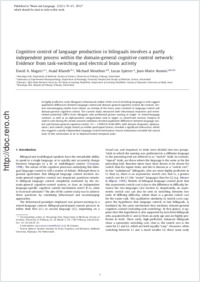Cognitive control of language production in bilinguals involves a partly independent process within the domain-general cognitive control network: Evidence from task-switching and electrical brain activity
- Magezi, David A. Neurology Unit, Department of Medicine, Faculty of Sciences, University of Fribourg, Switzerland
- Khateb, Asaid Laboratory of Experimental Neuropsychology, Department of Neurology, University Hospital and Faculty of Medicine, Geneva, Switzerland - Edmond J. Safra Brain Research Center for the Study of Learning Disabilities, Department of Learning Disabilities, Faculty of Education, University of Haifa, Israel
- Mouthon, Michaël Neurology Unit, Department of Medicine, Faculty of Sciences, University of Fribourg, Switzerland - Laboratory of Experimental Neuropsychology, Department of Neurology, University Hospital and Faculty of Medicine, Geneva, Switzerland
- Spierer, Lucas Neurology Unit, Department of Medicine, Faculty of Sciences, University of Fribourg, Switzerland
- Annoni, Jean-Marie Neurology Unit, Department of Medicine, Faculty of Sciences, University of Fribourg, Switzerland - Laboratory of Experimental Neuropsychology, Department of Neurology, University Hospital and Faculty of Medicine, Geneva, Switzerland - Neurology Unit, Hospital of Fribourg, Fribourg, Switzerland
-
08.05.2012
Published in:
- Brain and Language. - 2012, vol. 122, no. 1, p. 55–63
Event related potentials ERPs
Source localisation
Task selection
Overt naming
First language
Second language
English
In highly proficient, early bilinguals, behavioural studies of the cost of switching language or task suggest qualitative differences between language control and domain-general cognitive control. By contrast, several neuroimaging studies have shown an overlap of the brain areas involved in language control and domain-general cognitive control. The current study measured both behavioural responses and event-related potentials (ERPs) from bilinguals who performed picture naming in single- or mixed-language contexts, as well as an alphanumeric categorisation task in single- or mixed-task context. Analysis of switch costs during the mixed-context conditions showed qualitative differences between language control and domain-general cognitive control. A 2 × 2 ANOVA of the ERPs, with domain (linguistic, alphanumeric) and context (single, mixed) as within-participant factors, revealed a significant interaction, which also suggests a partly independent language-control mechanism. Source estimations revealed the neural basis of this mechanism to be in bilateral frontal–temporal areas.
- Faculty
- Faculté des sciences et de médecine
- Department
- Médecine 3ème année
- Language
-
- English
- Classification
- Biological sciences
- License
-
License undefined
- Identifiers
-
- RERO DOC 29576
- DOI 10.1016/j.bandl.2012.04.008
- Persistent URL
- https://folia.unifr.ch/unifr/documents/302425
Statistics
Document views: 137
File downloads:
- pdf: 352
